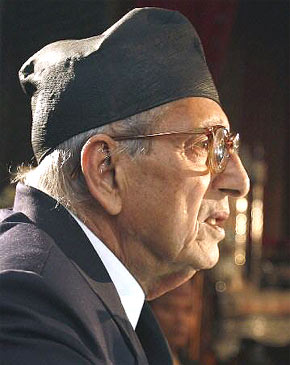| Home / International / International -- Update | Tools: Save | Print | E-mail | Most Read |
| Parliament Acts to Cut King's Powers |
| Adjust font size: |
Nepal's reinstated parliament yesterday unanimously approved a sweeping plan to curtail the powers of the king and take away his control over the army. The historic move came less than a month after often violent mass protests across the Himalayan nation pressured King Gyanendra to reinstate parliament and hand power back to a multi-party government. The landmark resolution was approved by a verbal vote by deputies in the 205-member house, less than two hours after it was presented by Prime Minister Girija Prasad Koirala.
The proclamation takes away the title of supreme commander-in-chief of the military from the king, traditionally revered as an incarnation of Hindu God Vishnu. The government will no longer be called "His Majesty's Government" but just "Nepal Government." The country would also stop being a Hindu nation and become a secular state. "It reflects the aspirations of the people and respects the sacrifices of the people who were martyred during the movement," Koirala said as he tabled the resolution, referring to weeks of mass protests against King Gyanendra. "Now no one can dare underestimate this. I urge people to remain alert and rise against anyone who tries to interfere in this and undermine this," Koirala said, speaking in Nepali.
Cutting the monarch's powers was a key demand of last month's protests against the king. The proclamation also taxes the king and allows his actions to be challenged in court. The principal advisory body of the king, the Raj Parishad or privy council, is scrapped, the Royal Nepalese Army renamed Nepali Army, and the army chief would be appointed by the cabinet. Overrides constitution? Besides, parliament will have the power to make laws on the heir to the throne, decide on the perks and expenses of the king and be responsible for his security while his secretariat is placed under the national civil service. Analysts have expressed doubts over the effectiveness of the proclamation, as under the current constitution no parliamentary bill can become law until the head of state the king signs it. But politicians say the proclamation overrides the constitution and reflects the will of the people and therefore cannot be challenged. They also say the king would have no powers and the proclamation would not need his approval. "If anyone tries to dishonour this, they will be digging their own grave," former Prime Minister Sher Bahadur Deuba told parliament. While parliament debated the resolution, hundreds of demonstrators gathered outside its gates holding placards and shouting slogans supporting the bill. Nepal fell into political turmoil after Gvanendra sacked the government and assumed power last year, saying the government had failed to quell an anti-monarchy extreme-leftist revolt that has killed more than 13,000 people. The new government has reciprocated a rebel truce, and the ultra-leftists have agreed to talks ahead of elections to a new assembly to draft a constitution and decide the future of the monarchy. (China Daily May 19, 2006)
|
| Tools: Save | Print | E-mail | Most Read |
 |
| Related Stories |
| ? |
